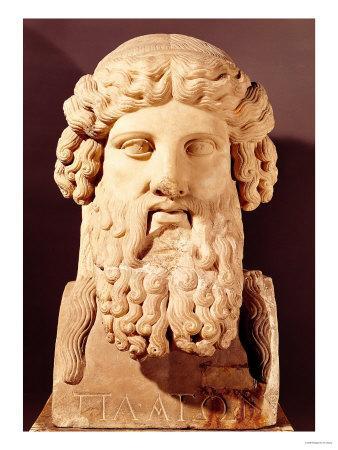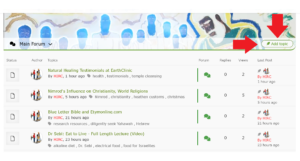Note the attempt to show Plato’s curls in his beard and hair using the stone medium. Along with full lips and nose, these are features typical of Israelites with some Edomite maternal ancestry mixed in–a frequent occurrence in Greek captivity, also prevalent in Roman & modern day American captivities.
Plato’s Metaphor of “the Good” which likens it to the sun and our ability to see is a beautiful description of how through acts of righteousness we strength our ability to “see” and to know wisdom. Here are 2 areas where the scriptures support that understanding.
Conversely, the same way we gain wisdom and power (light) on the right-hand side, the Edomites (and wicked Israelites) do it on the left-hand side by committing sin (i.e. evil). The more egregious and perverse the sin, the more power and false wisdom (darkness) on the left-hand side gained.
Wisdom of Solomon 1
- 1 Love righteousness, ye that be judges of the earth: think of the Lord with a good (heart,) and in simplicity of heart seek him.
- 2 For he will be found of them that tempt him not; and sheweth himself unto such as do not distrust him.
- 3 For froward thoughts separate from God: and his power, when it is tried, reproveth the unwise.
- 4 For into a malicious soul wisdom shall not enter; nor dwell in the body that is subject unto sin.
- 5 For the holy spirit of discipline will flee deceit, and remove from thoughts that are without understanding, and will not abide when unrighteousness cometh in.
- 6 For wisdom is a loving spirit; and will not acquit a blasphemer of his words: for God is witness of his reins, and a true beholder of his heart, and a hearer of his tongue.
Luke 6
- 27 But I say unto you which hear, Love your enemies, do good to them which hate you,
- 28 Bless them that curse you, and pray for them which despitefully use you.
- 29 And unto him that smiteth thee on the one cheek offer also the other; and him that taketh away thy cloke forbid not to take thy coat also.
- 30 Give to every man that asketh of thee; and of him that taketh away thy goods ask them not again.
- 31 And as ye would that men should do to you, do ye also to them likewise.
- 32 For if ye love them which love you, what thank have ye? for sinners also love those that love them.
- 33 And if ye do good to them which do good to you, what thank have ye? for sinners also do even the same.
- 34 And if ye lend to them of whom ye hope to receive, what thank have ye? for sinners also lend to sinners, to receive as much again.
- 35 But love ye your enemies, and do good, and lend, hoping for nothing again; and your reward shall be great, and ye shall be the children of the Highest: for he is kind unto the unthankful and to the evil.
- 36 Be ye therefore merciful, as your Father also is merciful.
- 37 Judge not, and ye shall not be judged: condemn not, and ye shall not be condemned: forgive, and ye shall be forgiven:
- 38 Give, and it shall be given unto you; good measure, pressed down, and shaken together, and running over, shall men give into your bosom. For with the same measure that ye mete withal it shall be measured to you again.
Plato’s Metaphor of “the Good”
Excerpt From: Plato (427-347 BC), The Republic, Book 6, Translation by Benjamin Jowett
You can find the complete work and others for free at https://logoslibrary.org/ I highly recommend reading all of The Republic. The Timaeus, Critias and Statesmen will also provide tremendous insight but you must test everything by the scriptures. Here is where being very well versed in the scriptures is important to avoid going off and having your understanding corrupted.
Note: this is a translation, as with all translations, many important details are lost.
- Still, I must implore you, Socrates, said Glaucon, not to turn away just as you are reaching the goal; if you will only give such an explanation of the good as you have already given of justice and temperance and the other virtues, we shall be satisfied.
- Yes, my friend, and I shall be at least equally satisfied, but I cannot help fearing that I shall fail, and that my indiscreet zeal will bring ridicule upon me. No, sweet sirs, let us not at present ask what is the actual nature of the good, for to reach what is now in my thoughts would be an effort too great for me. But of the child of the good who is likest him, I would fain speak, if I could be sure that you wished to hear—otherwise, not.
- By all means, he said, tell us about the child, and you shall remain in our debt for the account of the parent.
- I do indeed wish, I replied, that I could pay, and you receive, the account of the parent, and not, as now, of the offspring only; take, however, this latter by way of interest, and at the same time have a care that I do not render a false account, although I have no intention of deceiving you.
- Yes, we will take all the care that we can: proceed.
- Yes, I said, but I must first come to an understanding with you, and remind you of what I have mentioned in the course of this discussion, and at many other times.
- What?
- The old story, that there is many a beautiful and many a good, and so of other things which we describe and define; to all of them the term “many” is implied.
- True, he said.
- And there is an absolute beauty and an absolute good, and of other things to which the term “many” is applied there is an absolute; for they may be brought under a single idea, which is called the essence of each.
- Very true.
- The many, as we say, are seen but not known, and the ideas are known but not seen.
- Exactly.
- And what is the organ with which we see the visible things?
- The sight, he said.
- And with the hearing, I said, we hear, and with the other senses perceive the other objects of sense?
- True.
- But have you remarked that sight is by far the most costly and complex piece of workmanship which the artificer of the senses ever contrived?
- No, I never have, he said.
- Then reflect: has the ear or voice need of any third or additional nature in order that the one may be able to hear and the other to be heard?
- Nothing of the sort.
- No, indeed, I replied; and the same is true of most, if not all, the other senses—you would not say that any of them requires such an addition?
- Certainly not.
- But you see that without the addition of some other nature there is no seeing or being seen?
- How do you mean?
- Sight being, as I conceive, in the eyes, and he who has eyes wanting to see; color being also present in them, still unless there be a third nature specially adapted to the purpose, the owner of the eyes will see nothing and the colors will be invisible.
- Of what nature are you speaking?
- Of that which you term light, I replied.
- True, he said.
- Noble, then, is the bond which links together sight and visibility, and great beyond other bonds by no small difference of nature; for light is their bond, and light is no ignoble thing?
- Nay, he said, the reverse of ignoble.
- And which, I said, of the gods in heaven would you say was the lord of this element? Whose is that light which makes the eye to see perfectly and the visible to appear?
- You mean the sun, as you and all mankind say.
- May not the relation of sight to this deity be described as follows?
- How?
- Neither sight nor the eye in which sight resides is the sun?
- No.
- Yet of all the organs of sense the eye is the most like the sun?
- By far the most like.
- And the power which the eye possesses is a sort of effluence which is dispensed from the sun?
- Exactly.
- Then the sun is not sight, but the author of sight who is recognized by sight?
- True, he said.
- And this is he whom I call the child of the good, whom the good begat in his own likeness, to be in the visible world, in relation to sight and the things of sight, what the good is in the intellectual world in relation to mind and the things of mind.
- Will you be a little more explicit? he said.
- Why, you know, I said, that the eyes, when a person directs them toward objects on which the light of day is no longer shining, but the moon and stars only, see dimly, and are nearly blind; they seem to have no clearness of vision in them?
- Very true.
- But when they are directed toward objects on which the sun shines, they see clearly and there is sight in them?
- Certainly.
- And the soul is like the eye: when resting upon that on which truth and being shine, the soul perceives and understands, and is radiant with intelligence; but when turned toward the twilight of becoming and perishing, then she has opinion only, and goes blinking about, and is first of one opinion and then of another, and seems to have no intelligence?
- Just so.
- Now, that which imparts truth to the known and the power of knowing to the knower is what I would have you term the idea of good, and this you will deem to be the cause of science, and of truth in so far as the latter becomes the subject of knowledge; beautiful too, as are both truth and knowledge, you will be right in esteeming this other nature as more beautiful than either; and, as in the previous instance, light and sight may be truly said to be like the sun, and yet not to be the sun, so in this other sphere, science and truth may be deemed to be like the good, but not the good; the good has a place of honor yet higher.
- What a wonder of beauty that must be, he said, which is the author of science and truth, and yet surpasses them in beauty; for you surely cannot mean to say that pleasure is the good?
- God forbid, I replied; but may I ask you to consider the image in another point of view?
- In what point of view?
- You would say, would you not, that the sun is not only the author of visibility in all visible things, but of generation and nourishment and growth, though he himself is not generation?
- Certainly.
- In like manner the good may be said to be not only the author of knowledge to all things known, but of their being and essence, and yet the good is not essence, but far exceeds essence in dignity and power.
- Glaucon said, with a ludicrous earnestness: By the light of heaven, how amazing!

